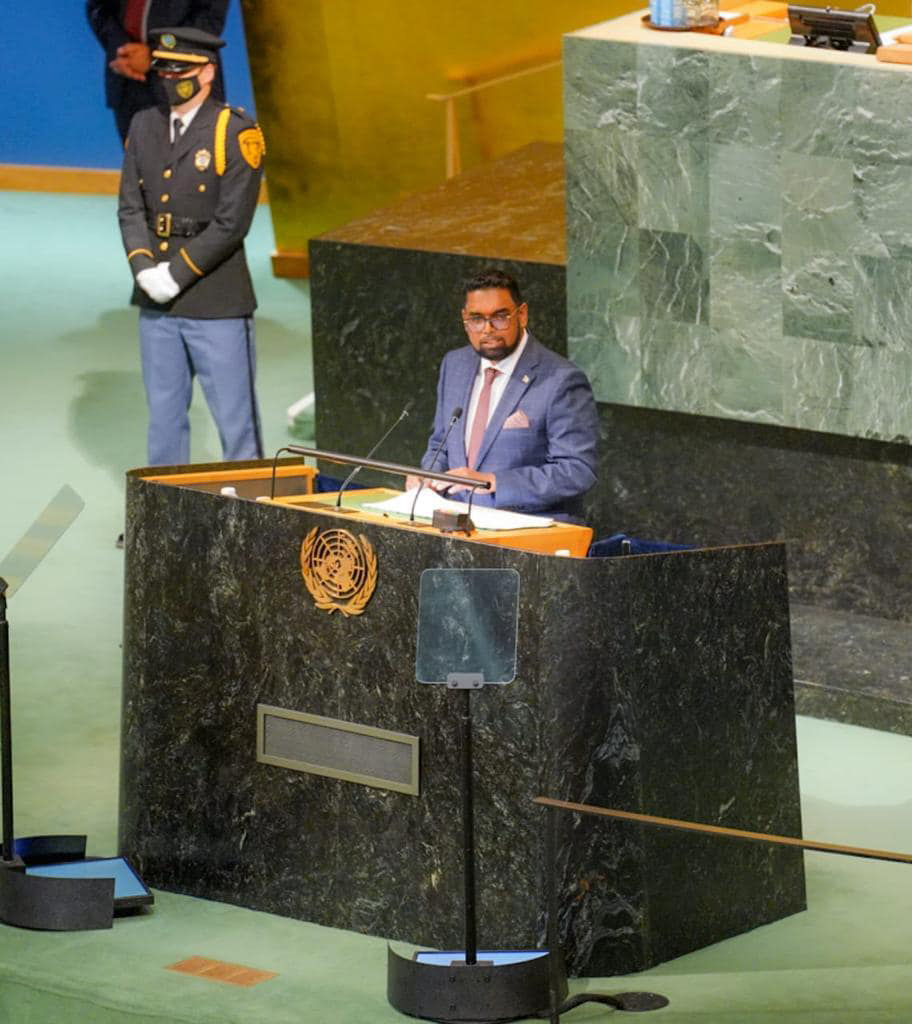President Irfaan Ali on Wednesday called on the developed countries to reexamine the financial gaps and debt portfolio of developing countries, while noting that it is a critical move for those countries to be able to recover from the COVID-19 pandemic and other external shocks.
The call was made during the Guyanese President’s address to the United Nations General Assembly in New York.
He noted that the world is facing a series of interlocking challenges, namely the COIVD-19 pandemic, climate change, energy and food crises and interstate conflicts. Ali said that as a consequence of the pandemic approximately 97 million more persons are living on less than US$1.90 per day, which significantly increases the global poverty rate and inequalities.
He told the world leaders that the developing world lost revenues and income which puts it further away from achieving many Sustainable Development Goals (SGDs).
Ali also pointed out that based on a March 2022 report from the UN, the discriminatory distribution of the COVID-19 vaccines caused a widening of the economic disparity between the rich and poor counties. He said that the study found that low income countries could have increased their GDP by US$16.7 million in 2021 if they had a similar vaccination rate, as high income developed countries.
“How are we going to address this inequality? How are we going to address this injustice? Guyana’s position is that there must be an immediate reexamination of the financing gap and the debt portfolio of the developing countries to open fiscal space and create an opportunity for recovery, bridging the gap and attaining the SDG goals.
“Guyana welcomes the global initiatives around pandemic preparedness. It is imperative that we collectively discuss how to address any potential pandemic and health trends so that we are better equipped in the future to avoid inequalities that exist,” Ali said during his address.
Food insecurity
Ali added that because of the widening gap caused by the pandemic and other external shocks, the world is experiencing severe food insecurity. He noted that at the end of 2020, 2.37 billion of the world’s population were declared food insecure and that number continues to rise. Additionally, the World Food Programme and Food and Agriculture Organization (FAO) warned that acute food insecurity will worsen in 20 hunger hotspots from June to September 2022.
He said that since the start of the pandemic, global food prices have surged by 65% and are expected to remain high in the medium term as a result of supply chain constraints, a hike in energy costs, higher shipping costs, climate issues, the war in Ukraine and the fertilizer crisis. The Guyanese leader told his global counterparts that since the onset of the Russian invasion of Ukraine, global food prices have increased sharply, reaching an all-time high in February 2022.
“The FAO projects that the production of cereals – a crop we rely on the most in the world – declined by 40 million tonnes or 1.4% when compared to the preceding year. The global food import bill trajectory is a whopping US$1.8 trillion this year, a record high. The global food import bill is projected to rise by US$51 billion from 2021…. The question is, what are we going to do about this?”
The President also pointed out that the ban on the export of wheat and rice from Russia and India, respectively, further contribute to the higher food prices. He noted that a reversal of these bans would see a decrease of 12.3% in the price of rice and 9% for wheat.
“In honouring our commitment to promote peace, stability, respect for territorial integrity, democracy and human rights for all, we must work collectively to prevent situations that can widen inequality and create social and economic havoc. Now is the time for us to decide if a new approach is needed to guarantee food security energy, security, climate security, access to healthcare and quality education and security from conflicts and wars,” he said.
Ali reminded the General Assembly that the World Bank reported that between January and February 2022, some 135 policy measures were announced or implemented that affected trade in food and fertilizer. During the same period, 34 nations imposed restrictive export measures on food and fertilizers.
He questioned whether globalization is only applicable under normal conditions or whether it is opportunistic in its application while calling out leaders for “locking” themselves in when crises arise.
“The evidence is glaring. COVID-19 vaccination and now access to food and fertilizer. A welcome initiative is the FAO’s global food import financing facility which seeks to respond to the prevailing soaring food import costs and address the needs of the most exposed.
“However, there is a need to revise the eligibility criteria to [include] countries beyond the categories of low income and low middle-income groups. This narrow grouping heightens the chance that many at-risk economically vulnerable countries such as the Caribbean with large food and food import needs will be excluded,” Ali informed.
Speaking about the direct plans for Guyana, President Ali related that his government is on a path to reducing Guyana’s food import bill and increasing food security through increased cultivation, investment in new technology and climate smart agriculture. He said that those investments are all aimed at positioning Guyana as a leading food producer in CARICOM.






